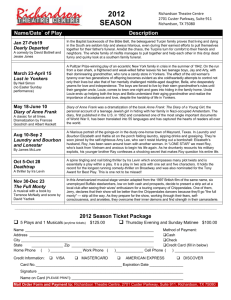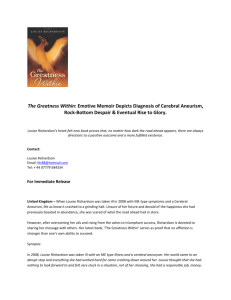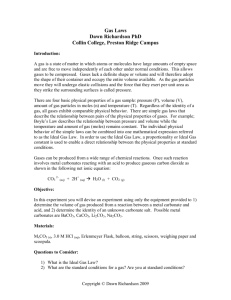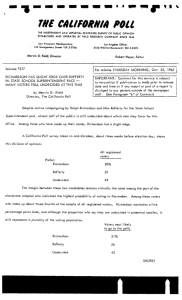18 to 36 Months - Family and Consumer Science
advertisement
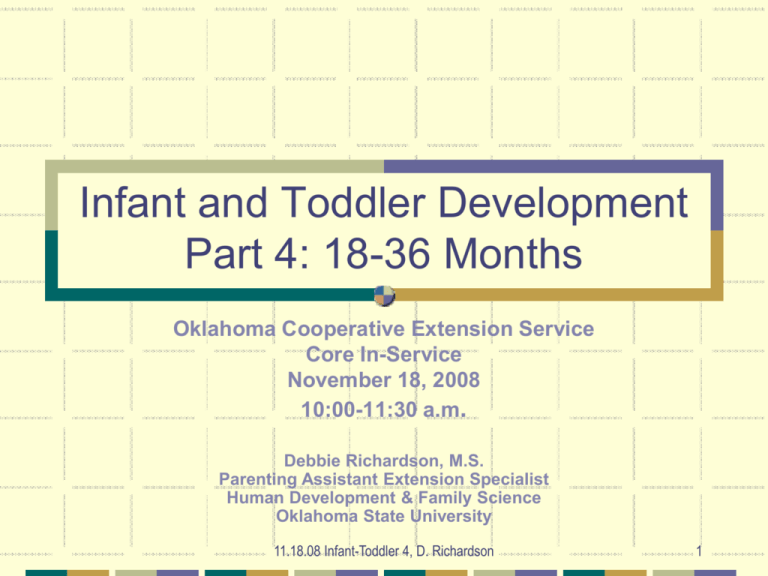
Infant and Toddler Development Part 4: 18-36 Months Oklahoma Cooperative Extension Service Core In-Service November 18, 2008 10:00-11:30 a.m. Debbie Richardson, M.S. Parenting Assistant Extension Specialist Human Development & Family Science Oklahoma State University 11.18.08 Infant-Toddler 4, D. Richardson 1 Introduction Welcome Centra Instructions Overview of In-service Resource Materials 11.18.08 Infant-Toddler 4, D. Richardson 2 In-Service Objective Extension Educators will be able to describe growth, tasks, behaviors, and abilities of toddlers from 18 through 36 months including physical, cognitive, social and emotional development. 11.13.2008 Infant-Toddler Dev 3, D. Richardson 3 18-20 Months (1 ½ Years) 11.18.08 Infant-Toddler 4, D. Richardson 4 18-20 Months Cognition Demonstrates functional use of objects toward objects. Appropriately uses most common objects & toys. Images & words associated with familiar objects. More tool use emerging. May find hidden toys/objects. Nests 2-3 cups. 11.18.08 Infant-Toddler 4, D. Richardson 5 18-20 Months Cognition (cont’d) Recognizes self in mirror. Autosymbolic play – pretends basic tasks. Problem-solving through symbolic combinations. Begins spontaneous symbolic play. Places circles and squares in a foam board. 11.18.08 Infant-Toddler 4, D. Richardson 6 18-20 Months Language Vocabulary spurt. Uses lots of gestures with words to get needs met (pointing, taking you by the hand). Uses at least 4 different consonants in babbling words. Beginning true verbal communication; words following functional & semantic relations. Names an object or picture; points to pictures of familiar objects (2-5) upon request. 11.18.08 Infant-Toddler 4, D. Richardson 7 18-20 Months Language (cont’d) Says several single words; starting to combine words (all gone; more milk, daddy go, etc.). Says “what’s that?” to elicit object names. Repeats words overheard in conversation. Comprehends 50+ words. Understands most words you use. Can say about 15 words. Points to 3 body parts on self. 11.18.08 Infant-Toddler 4, D. Richardson 8 18-20 Months Social-Emotional Plays alone with toys about 5+ minutes. Shows toy preferences. Play varies with one toy. Plays independently in company of peers. Imitates another child at play. Enjoys having simple stories read. Fears: separation from parent, toliet, injury, strangers Strong wish for independence. Sometimes says ‘no’. 11.18.08 Infant-Toddler 4, D. Richardson 9 18-20 Months Gross Motor Walks without using arms for balance. Climbs/steps up & down stairs with some assistance. Throws ball toward intended direction, up to 3 feet. Walks into ball; Kicks ball forward. Trots or walks fast; running stiffly. Stand on one foot while hands are held. 11.18.08 Infant-Toddler 4, D. Richardson 10 18-20 Months Fine Motor Towers 3-4 blocks. Turns single pages of cardboard book. Uses spoon; feeds self pretty well. Drinks from open cup independently with minimal spilling. Cooperates with tooth brushing; wash & dry hands. Removes simple articles of clothing without help. Pulls apart snap beads. Imitates a vertical stroke. 11.18.08 Infant-Toddler 4, D. Richardson 11 21-24 Months (approaching 2 years) 11.18.08 Infant-Toddler 4, D. Richardson 12 21-24 Months Cognition Mentally remembers object and figures out where it went. Brings object from another room on request. Symbolic play extends beyond child’s self. Performs pretend activities on more than one person or object. Follows directions; generally unable to remember rules. Distinguishes between food and non-food substances. Completes 3 piece form board. 11.18.08 Infant-Toddler 4, D. Richardson 13 21-24 Months Cognition (cont’d) Stacks & knocks down blocks; fills then turns over container to dump out. Nests 3-4 cups. Combines 2 objects in play. Attempts to mend a broken toy. Representational play – daily experiences such as playing house; plays with dolls. Events short and isolated; no true sequence. 11.18.08 Infant-Toddler 4, D. Richardson 14 21-24 Months Language Uses sentence of 2-3 words. Names 2-3 objects or pictures. Follows simple commands/instructions without gestures. Repeats words. May refer to objects or persons not present. Identifies & points to 3-5 body parts on self when asked. Uses “please” and “thank you” if prompted. 11.18.08 Infant-Toddler 4, D. Richardson 15 21-24 Months Language (cont’d) Beginning word combinations with meaning. Uses animal sounds or names them. Responds to yes/no questions with head shake. Talks to self & jabbers expressively. Hums, tries to sing. Listens to short rhymes, finger plays. Enjoys looking at picture books. 11.18.08 Infant-Toddler 4, D. Richardson 16 21-24 Months Says 8-10 + words; pronunciation may be unclear. Uses about 40-50 words. Correctly pronounces most vowels, add’l consonants. Begins to use other speech sounds. May be able to use prepositions. Phrases & short sentences. Adding grammatical elements. Able to speak & be understood about ½ the time. Vocabulary of several hundred words. 11.18.08 Infant-Toddler 4, D. Richardson 17 21-24 Months Social-Emotional Same fears continue through age 2 - separation from parent, toilet, injury, strangers – and may expand. Separation anxiety may be fading, but still ‘shy’ around strangers. May become increasingly enthusiastic about company of other children; engages in parallel play. Make-believe play; enjoys role-playing. Imitates behavior and past events. Increasing attention span. 11.18.08 Infant-Toddler 4, D. Richardson 18 21-24 Months Social-Emotional (cont’d) Helps in simple household tasks. Picks up & puts away toys on request. Understanding of own autonomy; shows independent behavior; wants “my way”; likes to boss others. Usually responds to correction; stops behavior. Defends possessions; expresses ownership; doesn’t understand sharing. Finds it difficult to wait; wants things right now. 11.18.08 Infant-Toddler 4, D. Richardson 19 21-24 Months Social-Emotional (cont’d) Communicates needs such as thirst, hunger, bathroom. Shows sympathy to other children; may try to comfort. Likes to please others; afraid of disapproval & rejection; enjoys adult attention. May show anger by slapping, biting, and hitting. Sometimes stubborn and defiant; says “it’s mine”, “go away”, “I don’t like it”, “no” a lot. Gets angry sometimes and has temper tantrums. Refers to self by name. 11.18.08 Infant-Toddler 4, D. Richardson 20 21-24 Months Gross Motor Good balance & coordination. Steps up and down stairs without assistance. Runs with better coordination, about 10 ft. w/out falling. Climbs onto and down from furniture unsupported. Jumps down step with 1 foot forward with assistance. Jumps up 2” with both feet together. 11.18.08 Infant-Toddler 4, D. Richardson 21 21-24 Months Gross Motor (cont’d) Can kick ball without losing balance. Tosses or rolls large ball; can throw ball into a basket. Bends over to pick up toy without falling. Enjoys sitting on & moving small-wheeled riding toys. 11.18.08 Infant-Toddler 4, D. Richardson 22 21-24 Months Fine Motor May be showing hand preference. Unzips/zips large zippers. Eats with a fork. Places 4 stacking rings in any order. Towers 6-8 blocks. Browse through a book 1 page at a time. 11.18.08 Infant-Toddler 4, D. Richardson 23 21-24 Months Fine Motor (cont’d) Imitates horizontal stroke; scribbles spontaneously. Snips paper with scissors. Strings 1” bead with strong tip. Attempts to put on shoes & slippers. Attempts to open door by turning knob. Opens cabinets, drawers, boxes. 11.18.08 Infant-Toddler 4, D. Richardson 24 2 Years Physical Markers About 22 to 38 lbs. (ave. 28 lbs.) Height is about ½ total height the child will attain as an adult – about 32 to 38” tall. Approx. first 16 teeth have appeared. Vision fully developed. 11.18.08 Infant-Toddler 4, D. Richardson 25 25-30 Months (2–2 ½ Years) 11.18.08 Infant-Toddler 4, D. Richardson 26 25- 30 Months Cognitive Represent reality to themselves through use of symbols, mental images, words, gestures. Objects & events no longer have to be present to be thought about. Often fail to distinguish their point of view from others. Easily captured by surface appearances. Often confused about causal relations. The above points last until about 6 years old. 11.18.08 Infant-Toddler 4, D. Richardson 27 25- 30 Months Cognitive (cont’d) Can see how things are same or different. Matches objects; matches 4 colors. Identifies objects by their use. Recalls geometric shapes. Completes 3-6 piece inset puzzle. Understands the concept of ‘one’, then ‘two’. Engages in simple make-believe play. 11.18.08 Infant-Toddler 4, D. Richardson 28 25- 30 Months Cognitive (cont’d) Can pay attention to only one thing at a time. Represents/recalls events less frequently experienced or observed, particularly impressive or traumatic events. Plays doctor, store, shopping, teacher, mom/dad, child. Roles shift quickly; events still short & isolated. Realistic props required. Matches object to a picture in a book. 11.18.08 Infant-Toddler 4, D. Richardson 29 25- 30 Months Cognitive (cont’d) Curious what things are, what they do, how they work. Begins making mechanical toys work. Expands knowledge or shape/color. Knows spatial concepts such as ‘in’, ‘on’, ‘under’, ‘up/down’. Notices what comes “first, next, last” when routines are followed; doesn’t like changes in schedule – confusing. Knows mostly where things are located in and around house. Begins to reason from one situation to another similar situation. 11.18.08 Infant-Toddler 4, D. Richardson 30 25-30 Months (2- 2 ½ Years) Language Names 5 pictures. Recognizes action in pictures. Begins to use pronouns (I, you, me, we, they). Says “me”, “mine”, “no” a lot. May use action words such as go, run, look, eat. Begins to understand many sentences. Combines 3-4 words. Uses 50+ words. 11.18.08 Infant-Toddler 4, D. Richardson 31 25-30 Months (2- 2 ½ Years) Language (cont’d) May be able to identify friend by naming. Speaks clearly most of the time. Uses plurals and pronouns. Identifies objects or pictures by use. Asks a question using inflection. Gets excited about books, songs, & conversation. May repeat numbers but can’t count. Knows descriptive words such as ‘big’, ‘happy’ 11.18.08 Infant-Toddler 4, D. Richardson 32 25-30 Months (2- 2 ½ Years) Language (cont’d) Asks ‘why’, “what”, “where” questions. Responds appropriately to ‘why’ questions regarding routine activities. Can tell 2-3 sentences about an activity. Can use 2 adjectives. Knows name, age, gender. Names 6-8 body parts. Conversational. 11.18.08 Infant-Toddler 4, D. Richardson 33 25-30 Months (2- 2 ½ Years) Social-Emotional Pretends to be engaged in familiar activities or other events using toys as props. May ‘help’ with simple household tasks. Imitates adults & peers. Fears include: loud noises, animals, dark rooms, separation from parent, large objects/machines, change in personal environment. Shows affection. 11.18.08 Infant-Toddler 4, D. Richardson 34 25-30 Months (2- 2 ½ Years) Social-Emotional (cont’d) Greets familiar adults spontaneously. Readily expresses wide range of emotion Quick mood changes. Sense of self; positive or negative self-worth. Periods of strong independence; often stubborn, bossy, wants own way. 11.18.08 Infant-Toddler 4, D. Richardson 35 25-30 Months (2- 2 ½ Years) Social-Emotional (cont’d) Playing more with other children. May poke, push, pull in awkward attempt to make friends. Waits his/her turn. Sometimes shares toys with others when prompted. Starts to understand ‘mine’ vs. ‘his/hers’ or ‘yours’. Doesn’t understand others have feelings. 11.18.08 Infant-Toddler 4, D. Richardson 36 25-30 Months (2- 2 ½ Years) Gross Motor Runs easily. Stands/walks on tiptoes. Stands on one foot momentarily without assistance. Throws a ball 5 feet with direction. Jumps off the ground; may jump broadly (across). Walks up/down stairs alone, first placing both feet on each step with minimal assistance, then in a step-tostep manner without assistance. 11.18.08 Infant-Toddler 4, D. Richardson 37 25-30 Months (2- 2 ½ Years) Gross Motor (cont’d) Demonstrates overall coordination and balancing. Stoops, squats, bends over to pick up something without falling. Walks 2+ steps on a line alternating feet. Pedaling. Climbs well; may need help getting down. Likes rough & tumble play. 11.18.08 Infant-Toddler 4, D. Richardson 38 25-30 Months (2- 2 ½ Years) Fine Motor Feeds self independently with utensils with little spilling. Drinks from cup, eventually with one hand. Takes off clothes; puts on simple clothing without help. Washes/dries hands and brushes teeth with minimal assistance. 11.18.08 Infant-Toddler 4, D. Richardson 39 25-30 Months (2- 2 ½ Years) Fine Motor (cont’d) Separates 4 snap beads. Builds tower of 3-4 then up to 9 blocks. Removes cap from bottle; screws/unscrews jar lids, nuts, bolts. Turns rotating handles. Turns 1-3 pages of paper book. Draws 11.18.08 Infant-Toddler 4, D. Richardson 40 31-36 Months (2 ½-3 Years) 11.18.08 Infant-Toddler 4, D. Richardson 41 31-36 Months (2 ½ - 3 Years) Cognition Engages in functional play – simple, repetitive activities. Gender identity develops. Begins to understand big & little; relationship between part & whole (door of car, nose of animal). Selects toy hidden in correct hand when put behind back. Points/names a color; may recognize 3 colors. Matches 3 shapes; stacks 4-5 rings in order. 11.18.08 Infant-Toddler 4, D. Richardson 42 31-36 Months (2 ½ - 3 Years) Cognition (cont’d) Counts 3 objects. Completes simple puzzles. Makes mechanical toys work. Continues pretend activities. Play starts having a sequence; sequences evolve and are not planned; events are not isolated. 11.18.08 Infant-Toddler 4, D. Richardson 43 31-36 Months (2 ½ - 3 Years) Cognition (cont’d) Compensatory stories: re-enactment of experiences, events with new outcomes. Associative play: loosely organized around a common activity, shared interests & materials. Reasons from effect back to cause. Understands before, after, now, soon, later Expanding attention span – up to about 10 min. 11.18.08 Infant-Toddler 4, D. Richardson 44 31-36 Months (2 ½ - 3 Years) Language Very talkative. Vocabulary of many hundreds of words (200-800). Speech is more accurate; may still leave off ending sounds, stumble or stutter when trying to express self. Recognizes/identifies most common objects & pictures. Understands most sentences. Uses 3-5 word phrases/sentences consistently. Answers what, where, or yes/no questions. 11.18.08 Infant-Toddler 4, D. Richardson 45 31-36 Months (2 ½ - 3 Years) Language (cont’d) Distinguishes on, in, under, big, little. Starts using past tense, referring to future. Listens attentively to stories & books but doesn’t like if you skip or change a word. Uses words differently at different times. Repeats words and sounds. Uses words to express fears and insecurities by telling others “don’t look”, “don’t laugh”, etc. 11.18.08 Infant-Toddler 4, D. Richardson 46 31-36 Months (2 ½ - 3 Years) Social-Emotional Similar fears as 2 - 2 ½; some decrease in separation anxiety; fears imaginary things, unusual or dramatic appearances in other people. Begins to develop real friendships; may develop imaginary friend. Increasingly likes having peers and other adults around. Separates easily from caregiver in familiar surroundings. Imitates behavior of others. 11.18.08 Infant-Toddler 4, D. Richardson 47 31-36 Months (2 ½ - 3 Years) Social-Emotional (cont’d) Demonstrates increasing independence; defiant behavior. Follows simple rules, suggestions. Makes simple choices. Enjoys playing alone, but near other children. Can play cooperatively for short periods. Shares & take turns sometimes, but still does not cooperate well. 11.18.08 Infant-Toddler 4, D. Richardson 48 31-36 Months (2 ½ - 3 Years) Social-Emotional (cont’d) Participates in circle games. Acts out social encounters through play activities. Expresses wide range of emotions. Objects to minor changes in routines. Realizes own skills. Acts to please adults. 11.18.08 Infant-Toddler 4, D. Richardson 49 31-36 Months (2 ½ - 3 Years) Social-Emotional (cont’d) Helps others. Seeks assistance. Directs others. Enjoys making others laugh and being silly. Spends a great deal of time watching & observing. Enjoys hearing stories about self & playing ‘house’. 11.18.08 Infant-Toddler 4, D. Richardson 50 31-36 Months (2 ½ - 3 Years) Gross Motor Throws ball overhand; catches a large ball. Jumps over a line. Ascends/descends stairs alternating feet without help. May swing leg to kick ball; more accurate kicking. Rides on tricycle using pedals. Can briefly balance and hop on one foot. Enjoys fast moving activities. 11.18.08 Infant-Toddler 4, D. Richardson 51 31-36 Months (2 ½ - 3 Years) Fine Motor Holds pencil in writing position. Scribbles spontaneously. Makes or copies lines & circles with pencil/crayon. Turns one page at a time. Builds 3 block bridge with demonstration. Might use one hand more frequently than another. Undoes some buttons, laces, zippers. Cuts across 6” piece of paper with scissors. Easily places small objects in a small opening. 11.18.08 Infant-Toddler 4, D. Richardson 52 3 Years Physical Markers Gained about 4-5 lbs. and grown about 2-3” in last year. About 25 to 44 lbs. and 34 to 43”. Develops taller, leaner appearance. Has all 20 primary teeth. Sleeps 10-12 hours per night plus daytime nap. 11.18.08 Infant-Toddler 4, D. Richardson 53 Toilet Learning 11.18.08 Infant-Toddler 4, D. Richardson 54 Toilet Learning About 18-20 mos. - Indicates discomfort over soiled diapers verbally or with gestures. About 2 yrs. - May be psychologically ready for toilet learning. Begins to gain some control of bowels & bladder. About 28 mo. - Indicates need to use the bathroom. About 33 mo. - Distinguishes urination & bowel movements. About 3 yrs. - May have daytime & possibly nighttime control over bowel & bladder functions. About 36-38 mos. - May have full control, use toilet on own. Boys often do not complete toilet learning until 3 ½ (42 mo.). 11.18.08 Infant-Toddler 4, D. Richardson 55 Wrap-up Questions Discussion In-service evaluation Follow-up Next session Nov. 25: Early brain development, learning, and mental health 11.18.08 Infant-Toddler 4, D. Richardson 56 References In addition to the provided resource materials listed on the in-service agenda, various textbooks and other reference materials used for this presentation are available upon request. 11.13.2008 Infant-Toddler Dev 3, D. Richardson 57

